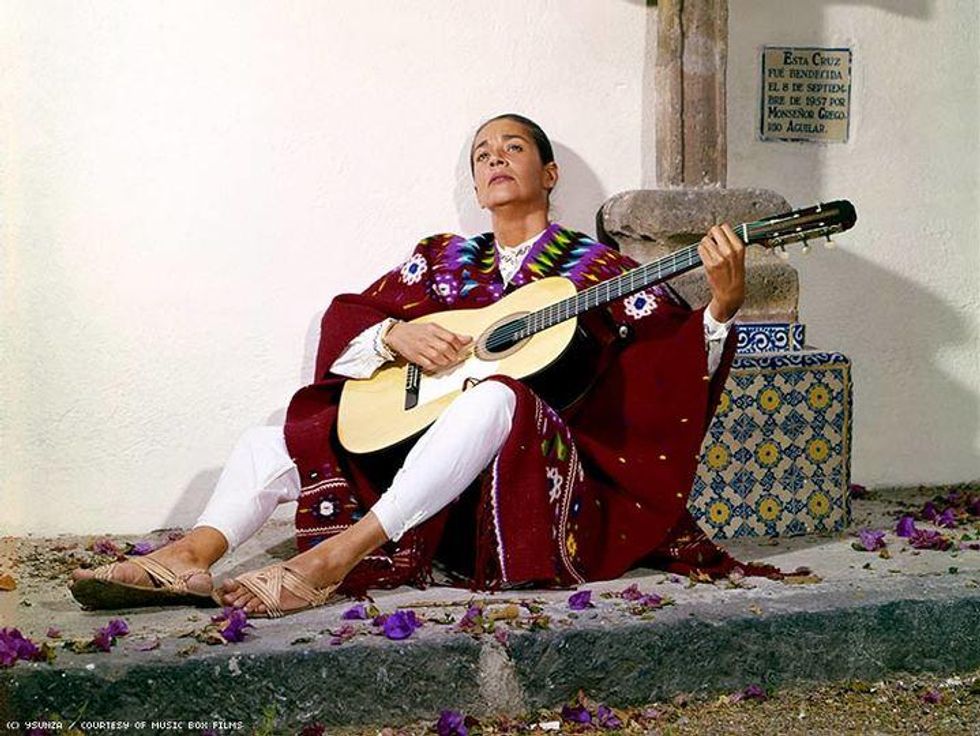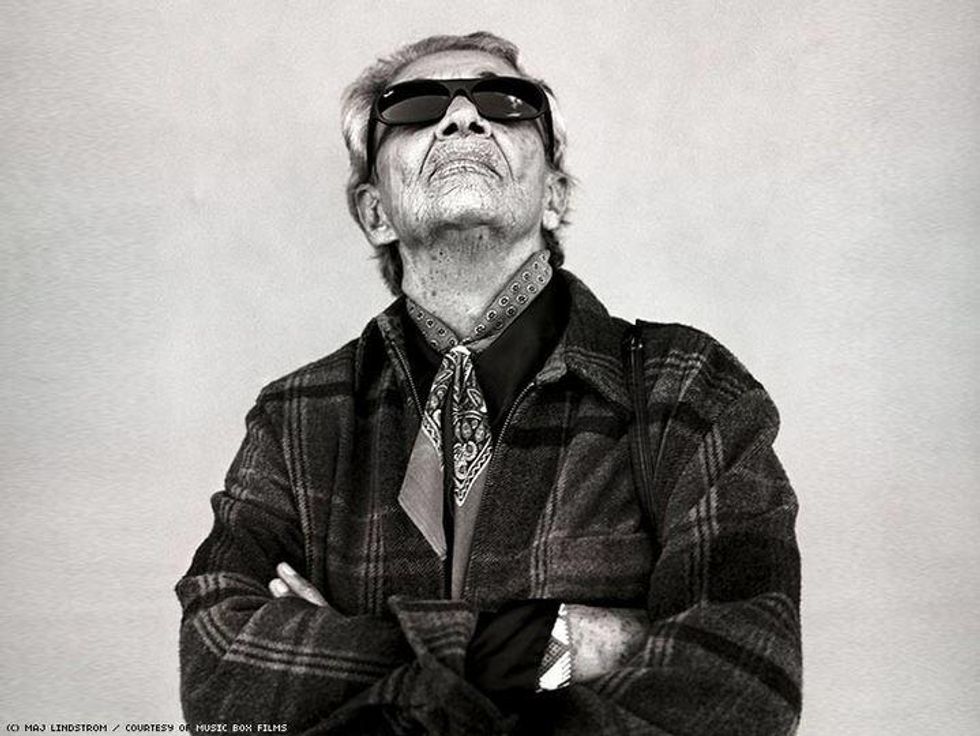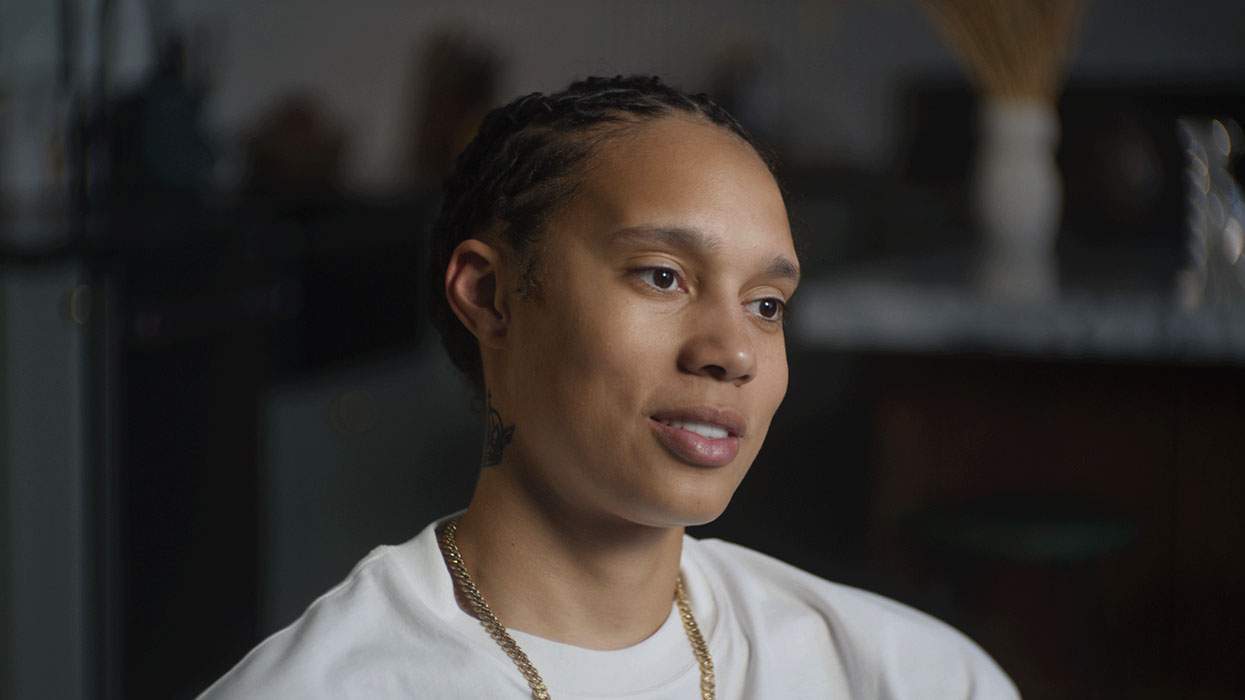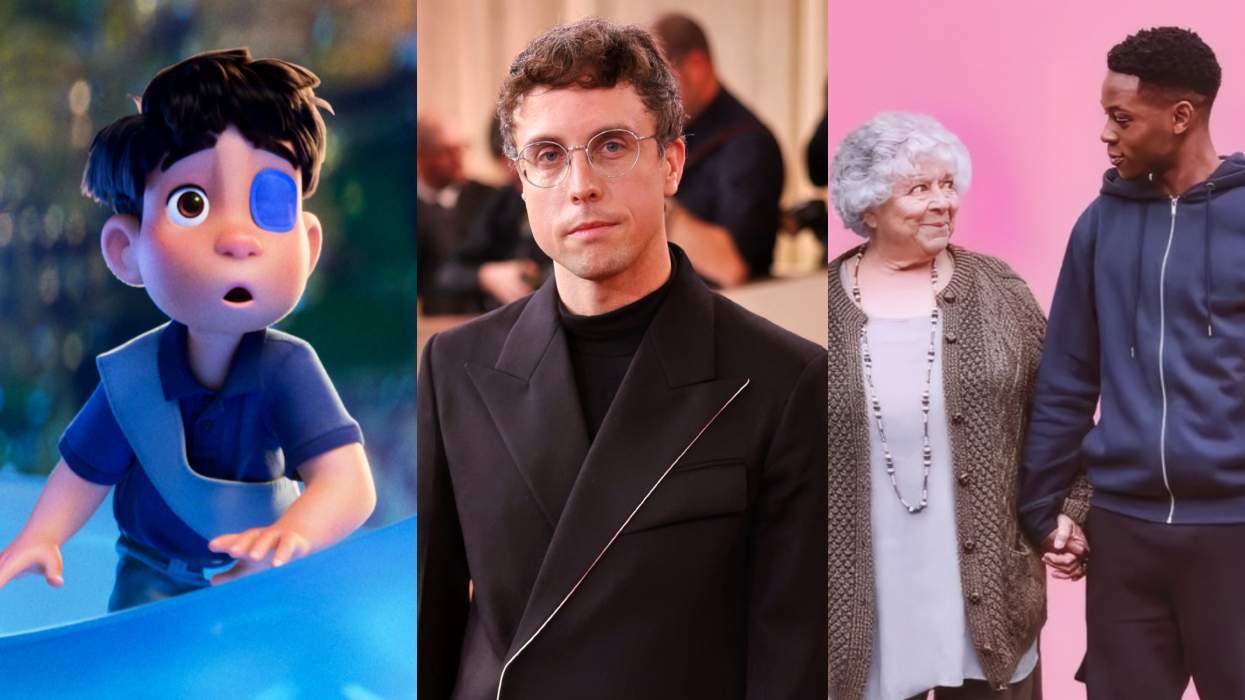Beloved ranchera singer Chavela Vargas was larger than life: her music was transformative, her personality and sexual allure magnetic, and her life story, which included tales she told that may or may not have happened, added up to more than the sum of a life lived.
A lesbian who dazzled fans and lovers alike, she was both myth and mythmaker. In the new documentary, Chavela, directors Catherine Gund and Daresha Kyi weave together Vargas's performances, still photos, stock footage of the places she lived and frequented, interviews with her friends, lovers, and contemporaries, and a magnificent interview with the great woman herself that Gund shot in Mexico in 1991 to shape Vargas's life into a emotionally resonant tapestry. The film not only elucidates the facts of her existence, but is sure to cut straight to the heart of those who view it, much like hearing Vargas's music for the first time at the height of the AIDS epidemic transformed Gund.
"Let's start with where I'm going. At my age, it's more interesting for everyone to ask where I'm going, not where I've been. It will make your documentary more impactful" a 71-year-old Vargas tells Gund in that '91 interview, which the director dubbed the "Pink Shirt Interview," due to the salmon-hued button-down the singer wore.
Vargas, born in Costa Rica in 1919, had already lived a full life since moving to Mexico and becoming one of the country's greatest interpreters of ranchera songs, which brim with longing, desire, and anguish. During the 20-year third act that was to follow Gund's interview, she would become an international superstar beloved by luminaries like Pedro Almodovar (who's frequently featured her music in his films), performing right up to her death at age 91 in 2012.
"Somehow she must have known something," Gund told The Advocate of Vargas urging her to ask about the future. "She had to finish writing her story. My interview is sort of the fulcrum in the middle of the film because she had never performed on a big stage, she was not an international celebrity. And she hadn't been to Spain or met Pedro Almodovar."
Prior to Gund's visit to Mexico in the early '90s, the young filmmaker had never heard of Vargas until she encountered a lesbian community there that revered the singer.
"They played her music and it went straight into my heart, gave me a survival mechanism and helped me process my grief and believe that living was worthwhile," Gund said.
When the women saw that Gund was toting a video camera back when they weren't readily available in a back pocket, they encouraged her to interview Vargas, who was performing at El Habito in Mexico City at the time. Vargas agreed to an interview backstage at the cabaret before inviting Gund and a few of the women to her home for what would become the "Pink Shirt Interview."
The film from Gund and Kyi conveys Vargas's story in a fairly linear three-act structure that begins with young Vargas's career that blossomed when she finally eschewed the trappings of femininity other female ranchera singers embraced and donned her signature trousers and a poncho, then the film moves into a darker time during the late '70s and '80s when alcoholism gripped Vargas and she fell into obscurity, before closing with the glorious career she built in Spain in her 70s through to her death. But Gund's interview with Vargas, shot within months of the singer's reemergence from her alcoholic spiral, is interspersed throughout the various sections of the film, lending a sense of possible endlessness or infinity to Vargas's life.
It was an ironic sort of serendipity that brought Gund to Vargas in 1991 as they had both escaped death -- Vargas emerging from 12 years of flirting with the grim reaper at the hands of the bottle, and Gund fleeing from the loss of her best friend to AIDS and all those she lost before him. The camera was the instrument she used to preserve life.
"I was just shooting everything. I was accumulating footage." Gund said. "I really didn't think I was going to live any longer. I just thought everyone was going to die. That's how it felt then."
The Vargas footage sat in the can until after the singer's death when Gund decided to digitize all of her old footage and realized that what she'd shot with Vargas was akin to uncovering treasure.
On the surface, Chavela appears to be a more straightforward documentary than some of Gund's other more outwardly activist-leaning work, including 1998's Hallelujah! Ron Athey: a Story of Deliverance, about HIV-positive performance artist Ron Athey, and 2001's On Hostile Ground, which investigates abortion providers as figurative and literal targets. But a large part of Vargas's story is her unabashed queerness and bristling at gender stereotypes, although she didn't embrace the term lesbian until the age of 81. In merely weaving together Vargas's identity and her fiery love of women in with her career, from which neither can really be extricated, Gund and Kyi's film is deeply activist.
Kyi and Gund
"There's a way that for queers, it's so important, for all kinds of underrepresented people, it's so important to tell your own stories, because otherwise, it's like we don't exist," Gund, who identifies as queer, said. "And we do and we've always been there in all of our glory and pain and suffering and beauty and imagination."
To watch Vargas sing and speak is to be stopped in one's tracks, and the film treats the viewer to plenty of both. Vargas speaks with poetry and mystery that also appears to teem with hyperbole at times. When Vargas, who was indisputably Frida Kahlo's lover (she appeared in the Oscar-nominated 2001 biopic starring Salma Hayek), proclaims in the film that during the height of rubbing elbows with Hollywood royalty in Acapulco in the '50s, "I was at Elizabeth Taylor's wedding. Everybody went to bed with someone. I woke up with Ava Gardner," the truth of whether or not it happened is irrelevant.
"I think we're used to mythologizing celebrities because that happens to all of us because we want more intimacy than authentically exists or organically is possible. And yet she [Vargas] compounded that by creating myths about herself as well," Gund said. "I don't know if she had an affair with Ava Garder. She might have and she might not have, but it's completely consistent with her energy and her myth that she did, so that's why I include it."
If a few of the details of Vargas's life are clouded with fantastical tales, her legacy as one of the greatest interpreters of Mexican love songs and what Gund called her "profound identity as a lesbian," even if she didn't say it for most of her life, are unassailable, as evidenced by a few of her lovers who appear in the film relating details of her magnetism and passion. Vargas herself says, "How beautiful to be born a woman. Don't you think? What a privilege, right?"
Gund and Kyi, who've been friends since the '80s, have lovingly brought together pieces of an outsized life in a rich brocade that's sure to seduce viewers new to Vargas.
"She had a profound ability to create desire in the people around her whether they were listening to her music or just looking at her face," Gund said. "She was the epitome of a charismatic, generative, sexy person."
Chavela opens in select cities on October 6.



















